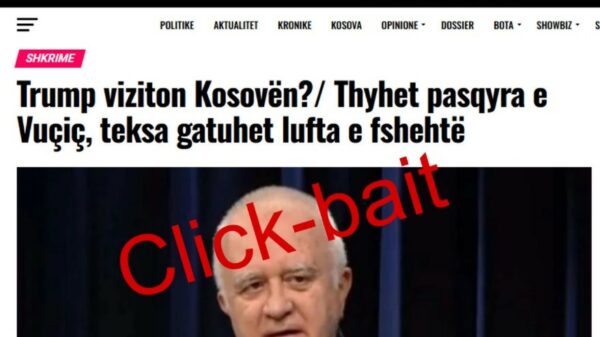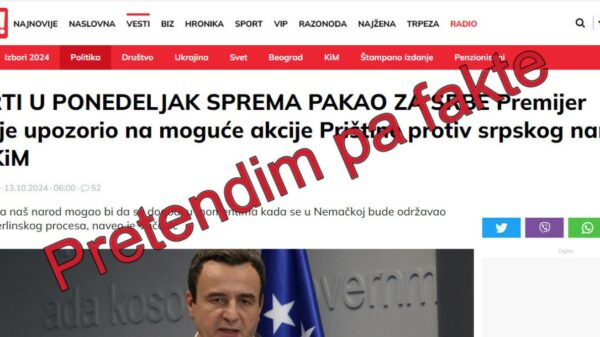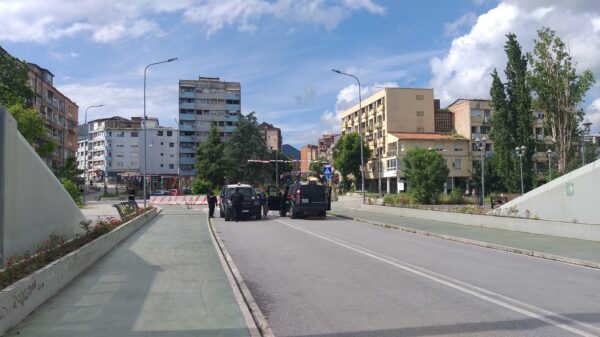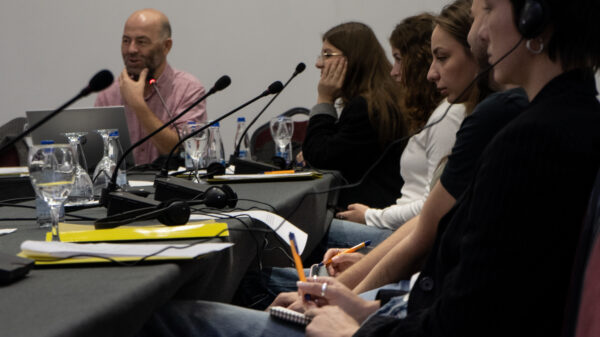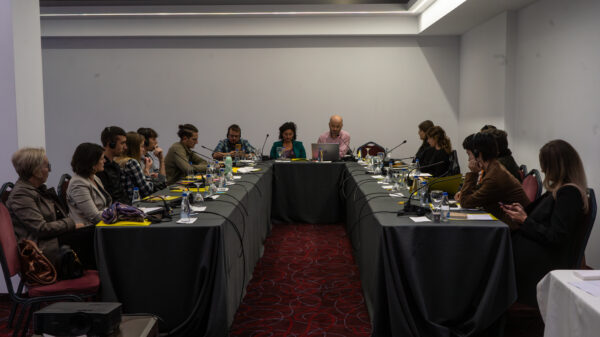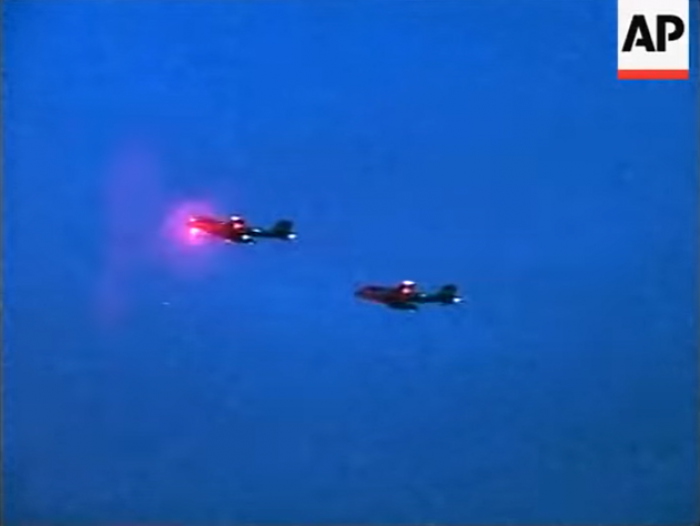Translated i përkthyer.
While reporting on the anniversary of the NATO intervention, as in previous years, politicians and some Serbian media operated with distorted information, to accuse NATO of "aggression" on the former Socialist Federal Republic of Yugoslavia (SFR Yugoslavia) in 1999. After Slobodan Milošević's refusal to stop the aggression on Kosovo and the exhaustion of all diplomatic means to resolve the Kosovo issue peacefully, on March 24, 1999, NATO launched a bombing campaign on Yugoslav military targets, which in international law was defined as humanitarian intervention.
On the 24th anniversary of the bombings, the Serbian media published multiple news and interpretations that feed the narrative that it was an "aggression" against an independent state. Thus, the number of civilian casualties as a result of the bombings has been manipulated. According to a report by Kosovo Online, with data resources from the Ministry of Defense of Serbia, "2500 civilians were killed, among them 89 children and 1031 members of the army and police".
Moreover, the former diplomats of the Serbian military that used to have political positions in the military during the Milošević rule, have spoken in negative tones against NATO.
The diplomat and former Minister of Foreign Affairs of the SFR Yugoslavia, Vladislav Jovanovic said that the consequences of the 1999 intervention are permanent and that "the aggression is continuing, but with other means".
Meanwhile, the former general of the Yugoslav police and army, Vladimir Llazarevic, in his statement about NATO's intervention, compared the current potential of the Serbian army with the time of NATO's intervention. "The Serbian army in 2023 is much better equipped than it was then, especially when it comes to anti-aircraft systems and aviation," he said. It’s important to remember that Llazarevic was convicted of war crimes in Kosovo, for aiding and abetting the deportation and violent transfer of the ethnic Albanian population of Kosovo, for which he was sentenced to 14 years in prison. Such statements prove that convicted war criminals continue to appear regularly in Serbian media.
Other Serbian officials have operated with fake photos from other countries to accuse NATO. The chairman of the People's Party, Vuk Jeremiq, has posted on Twitter a photo claiming that it was taken during the NATO bombing campaign. However, based on internet research, it appears that it was taken in Baghdad, in 2003. The former Minister of Foreign Affairs has called to never forgive NATO for the bombings, as he has also linked the developments of that time with the current Kosovo-Serbia dialog.
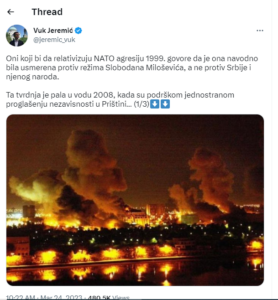
“The latest form in which we are asked for our consent is the so-called "French-German plan". Its acceptance would mean the legitimization of the 1999 aggression, as well as our voluntary and permanent renunciation of Kosovo.", Jeremic said.
Data from international organizations renounce the claims of the Serbs
Reliable international organizations have collected data related to the consequences of the bombings that contradict the claims from Serbia.
According to Human Rights Watch, the confirmed number of deaths is significantly lower than those presented to the Serbian public.
"Casualty reports vary, but converge in estimating a death toll of at least 1,200 to 5,000 civilians [...] After all, this is more than double the civilian death toll of around 500 that Human Rights Watch was able to verify," the report states. And Natasa Kandic from the Humanitarian Law Center said that, "according to the data collected, 756 people have been killed by the bombings".
Exhaustion of diplomatic means
Despite the claims of the Serbs, Western diplomats who know the developments around the Balkans since the 90s have explained the reasons that led to the bombings of the former SFR Yugoslavia. Thus, the US Ambassador in Belgrade, Christopher R.Hill, has emphasized that during his career he has learned that sometimes diplomacy fails, "when it does, the results can be tragic". However, he expressed condolences to the families of those who lost their lives in that period, as a result of the NATO air campaign.
“I offer my personal condolences to the families of those who lost their lives during the wars of the 1990s. I know that the Serbian people will never forget that terrible time, nor should they.” added Hill. American professor Edward Josephreacted to Hill's post, saying that these types of consolations influence the increase in the victimization of Serbs and Russians. Meanwhile, Donjeta Miftari, adviser to the president, Vjosa Osmani, has criticized Hill for deciding to rewrite history. According to her, NATO's intervention did not come as a result of a "failure of diplomacy" and Serbia really should not forget it, "precisely because it happened in response to actions of a brutal & genocidal regime".
The Rambouillet Conference, the turning point
The bombing of Serbia was preceded by a long diplomatic process in an attempt to stop Serbia's aggression by peaceful means, which culminated in the Paris negotiations.
From February 6 to 23, 1999, the Rambouillet Conference was held and after Miloševic's refusal to sign the agreement, the bombing campaign that lasted 78 days began. After the start of the NATO bombings, Serbia carried out the biggest massacres in Kosovo, such as Izbica, Rezalle, etc. Finally, Serbia was forced to retract from Kosovo on June 9, 1999 after the Kumanovo Agreement, in which Serbia accepted capitulation, allowing KFOR to enter Kosovo.
Despite the victimization that Serbia exhibits, they recognize the role and importance of NATO in regional security, especially in the protection of the Serbian community in Kosovo, considering the fact that KFOR is the main guarantor of their security.
Moreover, Serbia cooperates with the West in the military sphere as well. Thus, Kosovo’s northern neighbor joined the Partnership for Peace Program (PfP) in December 2006. As a participant in the Partnership for Peace, Serbia commits to cooperation and joint activities with NATO, which take place within the "Defense Reform Group" of NATO, as well as through the "Planning and Review Process - (PARP), which aims to promote reforms of the defense structure and to support the achievement of higher international operations.
However, 24 years after the accusations regarding the bombing campaign, KFOR, even in the perception of the citizens of Kosovo, continues to be the most reliable military force, which is not contested by the Albanians, nor by the Serbs.
*Prepared by: Ridona Berisha
*This article is published as part of the Western Balkans Regional Initiative against disinformation. “Western Balkans Anti-Disinformation Hub: exposing malign influences through watchdog journalism.”


















